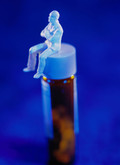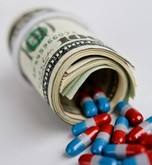Generics/Research
|
Posted 20/11/2015
When a brand-name drug is going off patent protection, pharmaceutical or generics companies may file an abbreviated new drug application (ANDA) for approval of a generic drug. As indicated by the US Food and Drug Administration (FDA), two drug products are claimed to be bioequivalent (BE) if the 90% confidence interval (CI) for the geometric mean ratio is totally within the bioequivalent limits of (80%, 125%) based on log-transformed data [1, 2] and an approved generic drug can be used as a substitute for the brand-name drug. FDA, however, does not indicate that approved generics of the same brand-name drug can be used interchangeably. Assume a patient switches the generic drug from BE 125% to BE 80% or from BE 80% to BE 125%, the change of the drug concentration in blood are both dramatic. As more generics become available in the marketplace, it is a concern whether the approved generics are safe and can be used interchangeably.





























